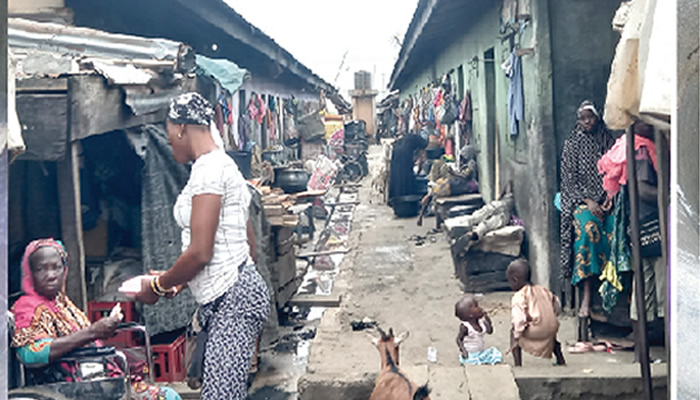Tucked away behind towering heaps of scrap metal and acrid smoke in the Jakande area of Alaba Rago, Ojo Local Government Area of Lagos State, lies a forgotten settlement where over 2,000 residents, many of them survivors of leprosy, live in conditions that shock the conscience. Known simply as the Lepers’ Containment, this community exists in a shadow of abandonment, invisible to both policy and empathy.
The first assault on the senses upon arrival is the stench, pungent, unrelenting, and clinging. It tells the story of years of neglect, of human suffering buried under the weight of plastic waste, decay, and human despair. Here, families inhabit makeshift shelters crafted from rusted zinc sheets, discarded wood, and decaying tarpaulin, materials salvaged from the nearby dumpsite that they now call home.
Children wander barefoot through chemical-laced puddles, their clothes threadbare and stiff from grime. Their laughter barely rises above the mechanical screech of the scrapyard. Yet, despite the hardship, life persists. Women still give birth at home, often unattended by medical professionals, with no access to clean water or proper sanitation.
Umar Abdullahi, now in his 70s, is regarded as the informal leader of this isolated community. Once a teacher in Kano with a decade of experience, his life took a drastic turn in the early 1980s when he was diagnosed with leprosy. Retrenched from his job and ostracised by society, Abdullahi migrated to Lagos in search of survival and community.
“I was a teacher with ten years of classroom experience,”. “But when I was diagnosed with this disease, I lost my job, my friends, my place in society. I had to come here and start afresh among people who understood my struggle.”
Although Nigeria has achieved the global target of leprosy elimination as a public health issue, the country remains one of the 17 nations still reporting more than 1,000 cases annually, according to the World Health Organisation. Leprosy, a chronic bacterial infection, is curable. But due to lingering stigma, many sufferers live in isolation and squalor.
Abdullahi and his fellow survivors now reside on land allocated to them decades ago under the administration of Lateef Jakande. It was meant to serve as a safe space for treatment and reintegration. Instead, it has become a dumping ground for electronic waste from nearby markets and a prison of poverty for its residents.
“People think leprosy is a death sentence,” Abdullahi said. “But our biggest problem now is not the disease, it is being forgotten by the rest of the world.”
The settlement lacks virtually all basic amenities. There is no running water, no functioning toilets, no electricity. The community relies on a borehole drilled in 2008, but fuel scarcity and cost prevent regular use of the generator required to pump water. When that fails, they draw from a shallow well that produces discoloured water, treated crudely with alum before consumption.
“We wait for three or four hours after adding alum before we use the water for cooking or drinking,” Abdullahi explained. “But that’s when we even have the money to buy alum.”
Sanitation is equally dire. With no toilet facilities available, residents defecate in the open. Some crawl across the muddy ground with missing limbs, dodging human waste and swarms of flies. The stench of the clogged gutters, blackened by years of stagnant water, only worsens with the rainy season.
Home births are common, not by choice but by lack of alternatives. The nearest medical facility is far, and most residents cannot afford transportation or hospital bills. Women give birth in the same zinc shacks where they sleep, using dirty water and rags, and often without trained assistance, placing both mother and child at extreme risk.
The community, once a symbol of refuge, now mirrors a humanitarian crisis in slow motion. The lack of government attention has turned the colony into an unregulated slum, where residents survive through begging and makeshift labour. While the disease is no longer the main threat, the stigma, poverty, and absence of care continue to bind these Nigerians in cycles of suffering.
For Abdullahi and others like him, their demand is simple: recognition and support. They do not seek sympathy, only the dignity of being treated as human beings who deserve clean water, healthcare, sanitation, and a chance at life beyond the shadows. As Lagos continues to modernise, their question remains unanswered, how long must the forgotten remain invisible?
